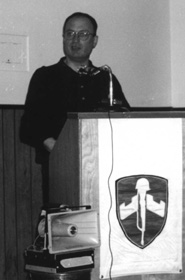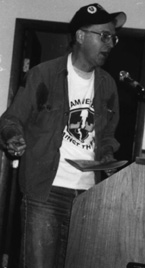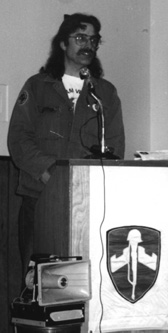 |
VVAW At 30: Still Trusted, Still Active, Still Having FunBy Joe Miller It all began with the premiere showing of Denis Mueller's new documentary Citizen Soldier: The Story of the Vietnam Veterans Against the War on Friday evening. There were just over one hundred folks there at the U.E. Hall for this event sponsored by Chicago Filmmakers. As we watched, laughter mixed with sobs as the faces and voices of fallen comrades like Jack McCloskey flickered across the screen. The film is historically and emotionally very powerful and could easily have become a major three- or four-hour epic. With the view toward producing an educational film and organizing tool that could be shown to community groups, as well as high school and college classes, Mueller kept the length of the film down to 55 minutes. Most everyone's response was overwhelmingly positive.
The afternoon was kicked off by Lisa Boucher (co-editor of The Veteran) with an antiwar song, "I Don't Want to Be a Soldier." This was followed by a poem, "I Don't Dance," from VVAW's West Coast Regional Coordinator, Steve Hassna. National Co-Coordinator Barry Romo then presented some opening remarks. Barry said it felt strange to be talking about VVAW and tradition, but that our tradition of just struggle against unjust wars, against racism and sexism, and an overall struggle for social justice must be passed on to new generations. We in VVAW should be proud of thirty years of struggle and thirty years of friendship. Barry also called for a moment of silence for fallen comrades.
VVAW leadership speeches and recollections followed a break. These remarks were mainly concerned with showing where VVAW came from and what we have been doing over the past thirty years.
Attendees then heard from the other co-editor of The Veteran, Jeff Machota, who also maintains our web site. Jeff pointed out how VVAW's historical example and continuing struggle is a strong support for succeeding generations of social justice activists. (See below) We also heard from VVAW's Midwest Regional Coordinator Johnny "Doc" Upton of Kansas City. Doc gave a little background on how he had connected with VVAW through Operation Dewey Canyon III in 1971. He arrived at the demonstration a member of Vets For Peace but went back to Kansas City a committed member of VVAW. Doc also talked about his work with the Vietnam Veterans Radio Network, which presents VVAW to an international radio audience these days. There was a very special presentation of VVAW's thanks to Maude DeVictor, who helped blow the whistle on Agent Orange in the late 1970s. Maude also thanked VVAW for being there for her during rough times, and she claimed all of us as her "family." Near the end of her comments, she said, "I could not have done it without you." We all realized that it went both ways: we could not have helped those victims of Agent Orange exposure without Maude's courage and persistence. Following another break, and after we were entertained by Phil Ochs' "Draft Dodger Rag" as sung by Lisa Boucher and Annie Hirschman, we heard from other members and friends of VVAW. This included our members from more recent conflicts like Grenada and the Persian Gulf War. Gulf War Marine combat vet Dave "Buzz" Doyle stepped to the podium to say, "I'm glad you made it as far as you did...You guys let me know we could all be crazy together." These words echoed the sentiments Buzz expressed in the Citizen Soldier video, where he pointed out just how crucial it was for his own survival and sanity to have VVAW welcome him into our ranks. Tim Andruss, who is a veteran of the attack on Grenada, pointed out (to groans from the crowd) that our 30th anniversary was only his tenth, as he is one of our younger members. Tim also made the transition from Vets for Peace to VVAW in 1987, as Doc Upton had in 1971. He said he felt honored and a little sheepish to be included in the speakers' list, but he also expressed his thanks to VVAW "for having the foresight to stick around for us." At this, Tim began to sob, and he was embraced by all three Annies and the applause of the crowd. For many of us, this answered the question, "Why are we still around?" Tony Russo, who with Daniel Ellsberg helped release the Pentagon Papers to the American people in 1971, pointed out that the system that produced wars like Vietnam and the Gulf War has not really changed. We still have a lot of work to do. Mark Hartford from Ohio explained how VVAW had reintroduced him to his humanity through the struggle against the war. Paul Wisovaty from Tuscola, Illinois joked about how the VFW magazine had declared "victory" in Vietnam through its own peculiar historical lenses. (See "Notes From The Boonies" on page 3)
Carl Nyberg, a Navy veteran and Annapolis grad (1989) who had joined VVAW that very day, then approached the podium to inform us of the progress of the campaign to ban landmines. Carl had been a Navy observer in Cambodia in 1993, and he described the continuing devastation these horrible weapons wrought. He suggested a variety of ways that other VVAW members might get involved in this campaign in the schools and in community groups. He also expressed an interest in working with anyone who wished to expose recruitment fraud, as he had done a tour as a Navy recruiter in Chicago up to 1995. He received cheers of support for his remarks. (See "Landmines" on page 1) Dong Tizon, one of VVAW's great friends in the Filipino community, then spoke. He reminded everyone that 1998 would see many events in remembrance of the Spanish-American War and the US takeover of colonies in Puerto Rico and the Philippines. Dong pointed out how the US, after testing weapons and tactics against Native Americans in the "Indian Wars," turned those weapons against the people of the Philippines who were struggling for independence. In reality, he said, the Philippine-American War of the turn of the century was the "first Vietnam War." He saluted VVAW for not confining itself to Vietnam veterans, for bringing in the younger vets, and he reiterated the theme we had heard so often during the day - how very important it was for all of us to share our memories and lessons with newer generations of political activists. (See 1898-1998 on page 1)
|


 Who would have thought that, thirty years after our first action, Vietnam Veterans Against the War (VVAW) would still be around? That was one of the central questions asked and responded to during the events surrounding VVAW's thirtieth anniversary in Chicago on May 16-17, 1997.
Who would have thought that, thirty years after our first action, Vietnam Veterans Against the War (VVAW) would still be around? That was one of the central questions asked and responded to during the events surrounding VVAW's thirtieth anniversary in Chicago on May 16-17, 1997.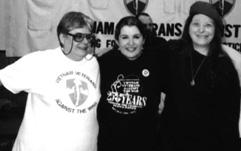 Saturday's events began around 12:45 PM, a little late, but not unexpectedly so. We were somewhat disappointed that more of our friends did not make it out for this day. Just under one hundred people joined us for the authors' panel, leadership speeches and recollections, and the speak-out. The event was hosted by Annie Bailey, Annie Hirschman, Annie Luginbill, and Laurie Sandow.
Saturday's events began around 12:45 PM, a little late, but not unexpectedly so. We were somewhat disappointed that more of our friends did not make it out for this day. Just under one hundred people joined us for the authors' panel, leadership speeches and recollections, and the speak-out. The event was hosted by Annie Bailey, Annie Hirschman, Annie Luginbill, and Laurie Sandow.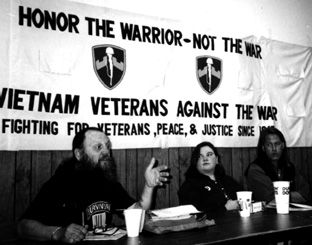 Next, we moved to the authors' panel which highlighted some of the recent and continuing work done about antiwar GIs and vets. Panelists included VVAW National Office staff person G. David Curry, Ph.D., author of Sunshine Patriots: Punishment and the Viet Nam Offender; Richard Moser, Ph.D., author of The New Winter Soldiers: GI and Veteran Dissent During the Viet Nam Era; Richard Stacewicz, Ph.D., author of the forthcoming Winter Soldiers: An Oral History of the Vietnam Veterans Against the War; Ms Keri Manning, graduate student at the University of Kentucky who is working on a major project concerning VVAW; and Steve Hassna, author and poet, who talked about the autobiographical work he has done in addition to his poetry.
Next, we moved to the authors' panel which highlighted some of the recent and continuing work done about antiwar GIs and vets. Panelists included VVAW National Office staff person G. David Curry, Ph.D., author of Sunshine Patriots: Punishment and the Viet Nam Offender; Richard Moser, Ph.D., author of The New Winter Soldiers: GI and Veteran Dissent During the Viet Nam Era; Richard Stacewicz, Ph.D., author of the forthcoming Winter Soldiers: An Oral History of the Vietnam Veterans Against the War; Ms Keri Manning, graduate student at the University of Kentucky who is working on a major project concerning VVAW; and Steve Hassna, author and poet, who talked about the autobiographical work he has done in addition to his poetry.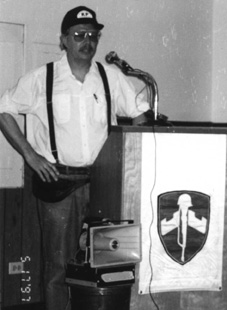 Bill Branson of the National Office staff talked about VVAW's work with the Homeless Standdowns in Chicago over the past four years, reminding us how important it was to be there for our brothers and sisters who were going through rough times.
Bill Branson of the National Office staff talked about VVAW's work with the Homeless Standdowns in Chicago over the past four years, reminding us how important it was to be there for our brothers and sisters who were going through rough times.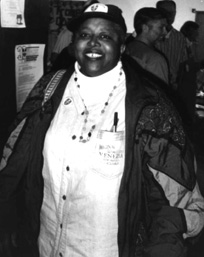
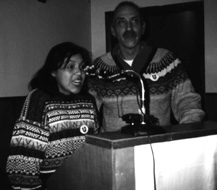 Louis DeBenedette told the crowd how VVAW kept him alive after he had turned against the war while still in the military. He brought his Peruvian goddaughter Liz up to the podium with him, and he explained how her mother had been disappeared seven years ago. Liz then thanked VVAW for helping Louis and for supporting just struggles of oppressed peoples around the world. She received a standing ovation from those in the room.
Louis DeBenedette told the crowd how VVAW kept him alive after he had turned against the war while still in the military. He brought his Peruvian goddaughter Liz up to the podium with him, and he explained how her mother had been disappeared seven years ago. Liz then thanked VVAW for helping Louis and for supporting just struggles of oppressed peoples around the world. She received a standing ovation from those in the room. We heard from many other friends and members of VVAW during that Saturday afternoon. Over and over, people commented on how VVAW had saved their lives by just being around and being a community of support. This good feeling and sense of being re-energized continued into the evening at a great party at Quencher's, a bar on Chicago's North side. This was a real celebration of VVAW's longevity and continued activity. If anyone had any doubts going into the weekend about this organization and its meaning to Vietnam veterans and other veterans, their friends, and younger political and social activists, they disappeared in the warmth and high spirits reflected by everyone
We heard from many other friends and members of VVAW during that Saturday afternoon. Over and over, people commented on how VVAW had saved their lives by just being around and being a community of support. This good feeling and sense of being re-energized continued into the evening at a great party at Quencher's, a bar on Chicago's North side. This was a real celebration of VVAW's longevity and continued activity. If anyone had any doubts going into the weekend about this organization and its meaning to Vietnam veterans and other veterans, their friends, and younger political and social activists, they disappeared in the warmth and high spirits reflected by everyone